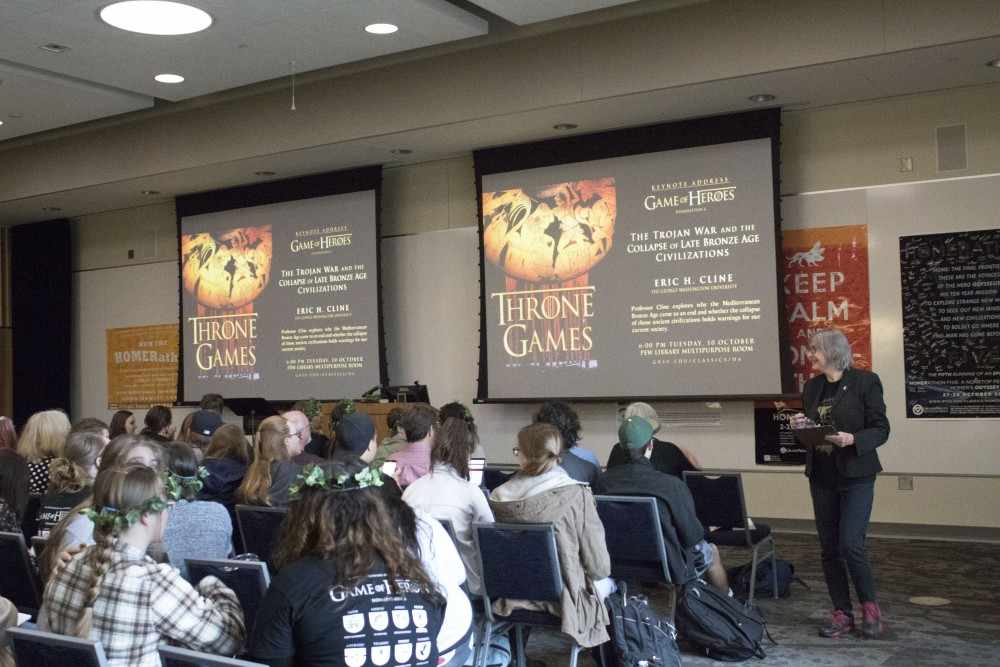News
GV Lanthorn on Homerathon 6
October 11, 2017

GRAND VALLEY LANTHORN
GVSU PRESIDENT, PROVOST SPEAK AT BIENNIAL 'HOMERATHON'
Campus
organizations partner to read 'The Iliad' over 24-hour period
By Nick Kondyles | 10/11/17 11:05 p.m.
[Image credit: GVL / Hannah Hill Students attend Game of Heroes: HOMERATHON 6. A Non-Stop Performance of Homer's ILIAD on Tuesday, October, 10, 2017.]
The biennial “Homerathon," a 24-hour event put on by the Grand Valley State University classics department, the Classics Society and Eta Sigma Phi, included the reading and performance of Homer’s "The Iliad," an extended piece of literature that stands at the fountainhead of the Greek literary tradition.
The event, which took place Tuesday, Oct. 10, in the Mary Idema Pew Library Learning and Information Commons, began with a reading in Ancient Greek from Provost and Executive Vice President for Academic and Student Affairs Maria Cimitile and ended Wednesday, Oct. 11, in the late afternoon.
“It’s a way to celebrate the Homeric poems and 'The Iliad' as a university,” said Charles Ham, assistant professor in GVSU's classics department. “The event demonstrates the interdisciplinary (subjects) of the department, including philosophy and history. We engage it in full partnership with the Mary Idema Library, the Classics Society and Eta Sigma Phi.”
The reading and performance also included an invocation of the muses read by students of the classics department, a scavenger hunt orchestrated by the Classics Society and Eta Sigma Phi, and a pizza party. The department used the theme "Game of Heroes" for the event, playing off the popular HBO TV series "Game of Thrones."
“Game of Thrones is getting very popular and, in general, it is one of the most-watched shows across seas,” said Audrey Fox, president of Eta Sigma Phi. “The dynamic works well for 'The Iliad,' the theme of war and the dialogue that is happening throughout the poem.”
The celebrated readers at the event were GVSU President Thomas Haas; Dean of the College of Liberal Arts and Sciences Fred Antzcak; and keynote speaker Eric Cline, an archaeologist, historian and classicist at Washington State University, who gave a presentation on the decline of ancient civilization in the Bronze Age.
“We’re taking a closer look at what went wrong in the late Bronze Age with the fall of civilization in 1207 B.C.E.,” Cline said. “There were two globalized civilizations where everybody is interacting with and happily trading with everybody else, theirs and ours.”
The Classics Society is sponsoring National Stoics Week in November, which includes mindful activities and a trip to the Detroit Institute of Arts to visit the Greek and Roman exhibit. Eta Sigma Phi will host a "surprise Caesar" potluck in March for recruitment to the honors fraternity, during which a classics professor will be picked as a target throughout the day.
The purpose of the Homerathon was to bring attention to both organizations, celebrate the integration of classics across disciplines and create a fun atmosphere for students who have never taken a classics course.
“People who don’t know Ancient Greek will hear the first 21 lines again in English but will get to appreciate the beautiful Greek meter during the reading,” Fox said. “Most find 'The Iliad' to be very relatable, though it’s not often viewed as such. Topics like strife and grieving are very prevalent themes throughout the text.
"Myths serve as mini lessons of moralization that are applicable to all college students.”
